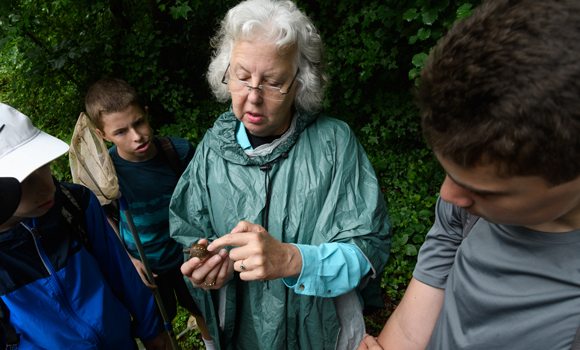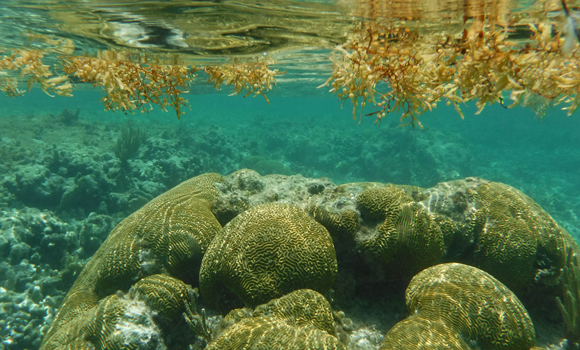UNC Greensboro’s Ann Berry Somers, senior lecturer in the Departments of Biology and Geography, Environment, and Sustainability and Lloyd International Honors College faculty fellow, has been named the winner of two prestigious state-level awards.
Somers will receive the Thomas L. Quay Wildlife Diversity Award in Raleigh July 18, and the North Carolina Association for Biomedical Research (NCBAR) Distinguished Teaching Award in STEM Education at the Bridging the Gap STEM education conference in October.
The Thomas L. Quay Wildlife Diversity Award recognizes individuals who provide leadership in the conservation of wildlife diversity in North Carolina. Among other accomplishments that led to this award, Somers spent 23 years serving on the Non-Game Wildlife Advisory Committee of the North Carolina Wildlife Resources Commission and began an organization called the Box Turtle Connection, which now has 32 sites across North Carolina.
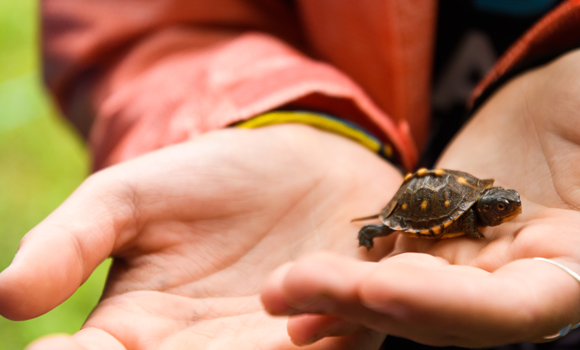
Conservation efforts provided by Box Turtle Connection (BTC) volunteers qualify for matching funds from federal grants to the state. Since the inception of BTC, their efforts will have served as a match for more than $1 million, which supports the NC Wildlife Resources Commission Wildlife Diversity Program.
Somers has worked with partner organizations such as NC Wildlife Federation, NC State Parks (particularly Haw River State Park), NC Herpetological Society, T. Gilbert Pearson Audubon Society, Greensboro Science Center, Kathleen Clay Edwards Family Branch Library, and others.
“It’s really about being inclusive and serving diverse populations of students who normally don’t have equal access to STEM education.”
The North Carolina Association for Biomedical Research award that Somers receives in October honors educators who have made extraordinary contributions to STEM education.
“This award is a big honor,” said Somers. “It’s really about being inclusive and serving diverse populations of students who normally don’t have equal access to STEM education. Besides through my teaching at UNCG, a lot of it was done through the teamwork on the HERP Project, with my wonderful colleagues, particularly Catherine Matthews, professor emerita in the School of Education.”
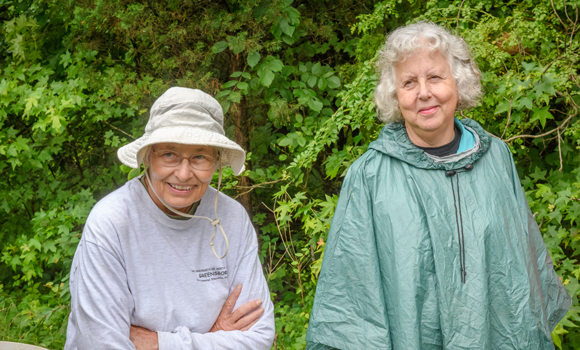
The HERP Project engages high school students in herpetological research experiences as active citizen-scientists. At the “herp camps” the students collect real-world data about the reptiles and amphibians all around. At least six camps across North Carolina have been supported by HERP Project material created by Somers and her colleagues, including camps at the Greensboro Science Center and Camp Chestnut Ridge.
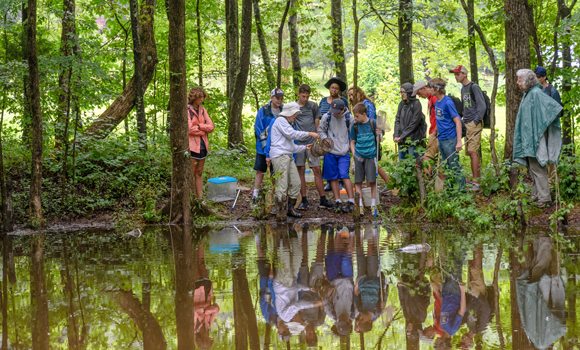
At UNCG Somers has created courses such as “Wildness as a Teacher” and “Biology and the Conservation of Sea Turtles,” for which students travel to Costa Rica to study and collect data on sea turtles and compare rescue and rehabilitation efforts to those in North Carolina.
This June, she traveled with students to the Central Caribbean Marine Institute at Little Cayman Island for the UNCG coral reef conservation course, a first-time offering in the Department of Geography, Environment, and Sustainability, and the only UNCG study abroad course that has involved scuba diving.
“Fresh out of the swimming pool, into the ocean we go,” she said, explaining that for most students, it was their first time diving in the ocean after being certified through a UNCG scuba course that begins in the swimming pool.
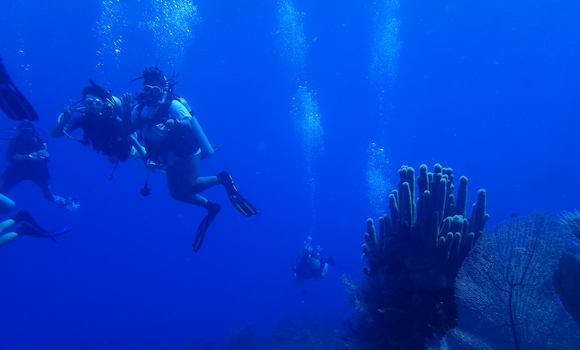
Somers herself only took up scuba diving two years ago, but her experience in deep waters showed her the urgency of familiarizing students with underwater research and coral reefs, including how they are threatened by warming waters and more acidic conditions caused by increasing greenhouse gasses from burning fossil fuels.
“Fresh out of the swimming pool, into the ocean we go.”
“It was being underwater myself and seeing the wonder-world that is coral reefs, and having the knowledge that coral reefs are in decline, that made me want to lead this course,” said Somers. “The ocean that we are experiencing now is different than the one that will be present 50 years in the future. We’ve got to come to terms with the future of the ocean and the urgency of the situation.”
As part of the course, the students also did beach clean-up and were active on social media, bringing consciousness about plastics in the ocean to their friends. Students say their hands-on experience helped them become more conscious of the ocean, and more conscientious about looking out for its future.
“Students are becoming more and more disturbed by the slow response of my generation to seriously addressing climate change and biodiversity loss. They give me great hope for the future. UNCG’s Environment and Sustainability Program is growing for a reason, and that is student awareness of just how critical the environmental dilemma is now and their desire to see substantial action moving towards solutions,” she said.
Somers says that UNCG has been an extremely generative place for her, as a teacher and scholar.
“UNCG has been a wonderful place for me to develop courses and to find colleagues with similar interests,” she said. “I thrive on teamwork and I certainly have found that at UNCG. Also, I have had a lot of support from my various department heads and program directors, in the Department of Biology and the Department of Geography, Environment, and Sustainability and from faculty across campus. The environment at UNCG has allowed me to thrive and develop my talents.”
Story by Susan Kirby-Smith, University Communications
Photography by Martin W. Kane, University Communications, and Kylie Pond
